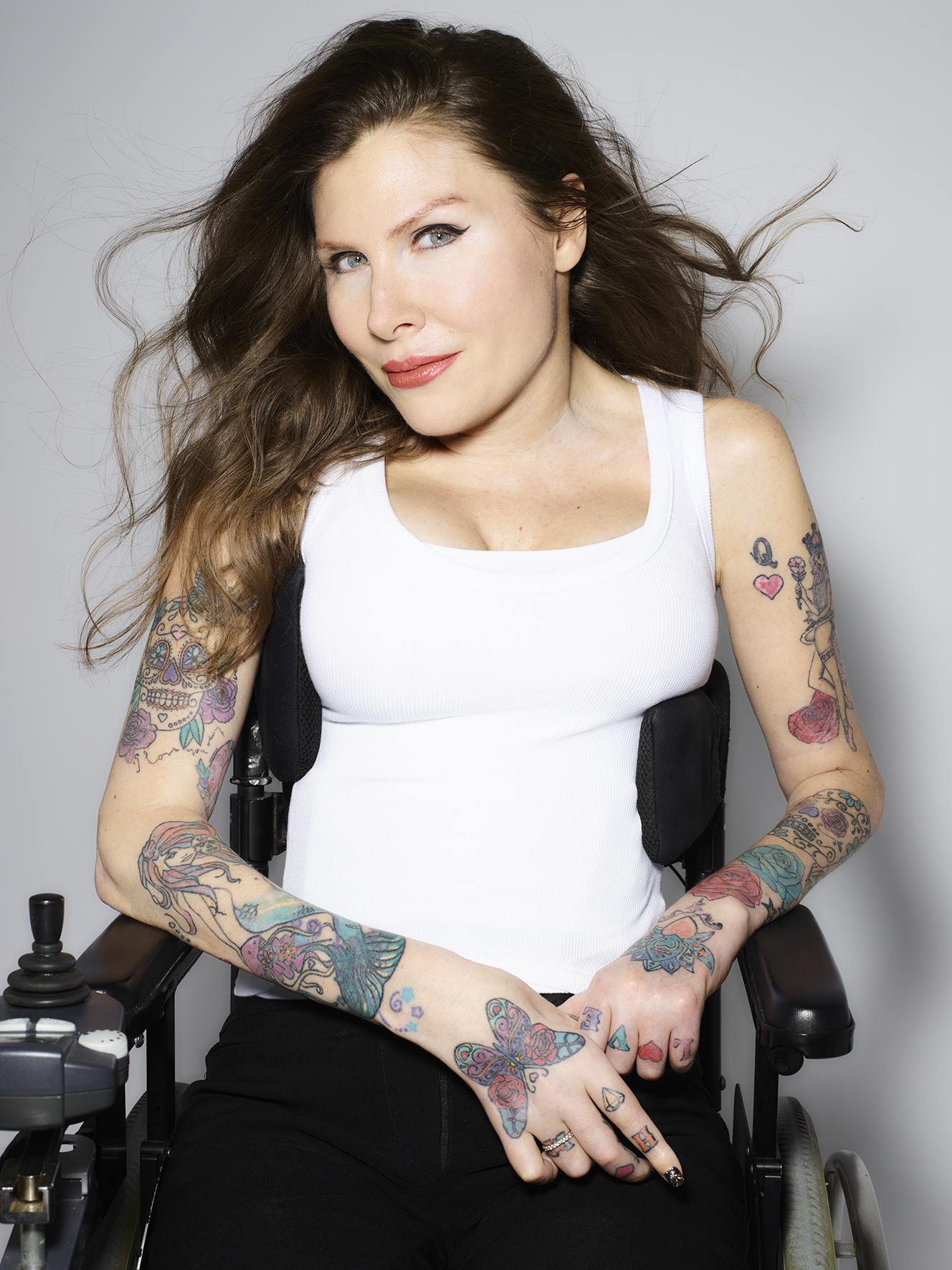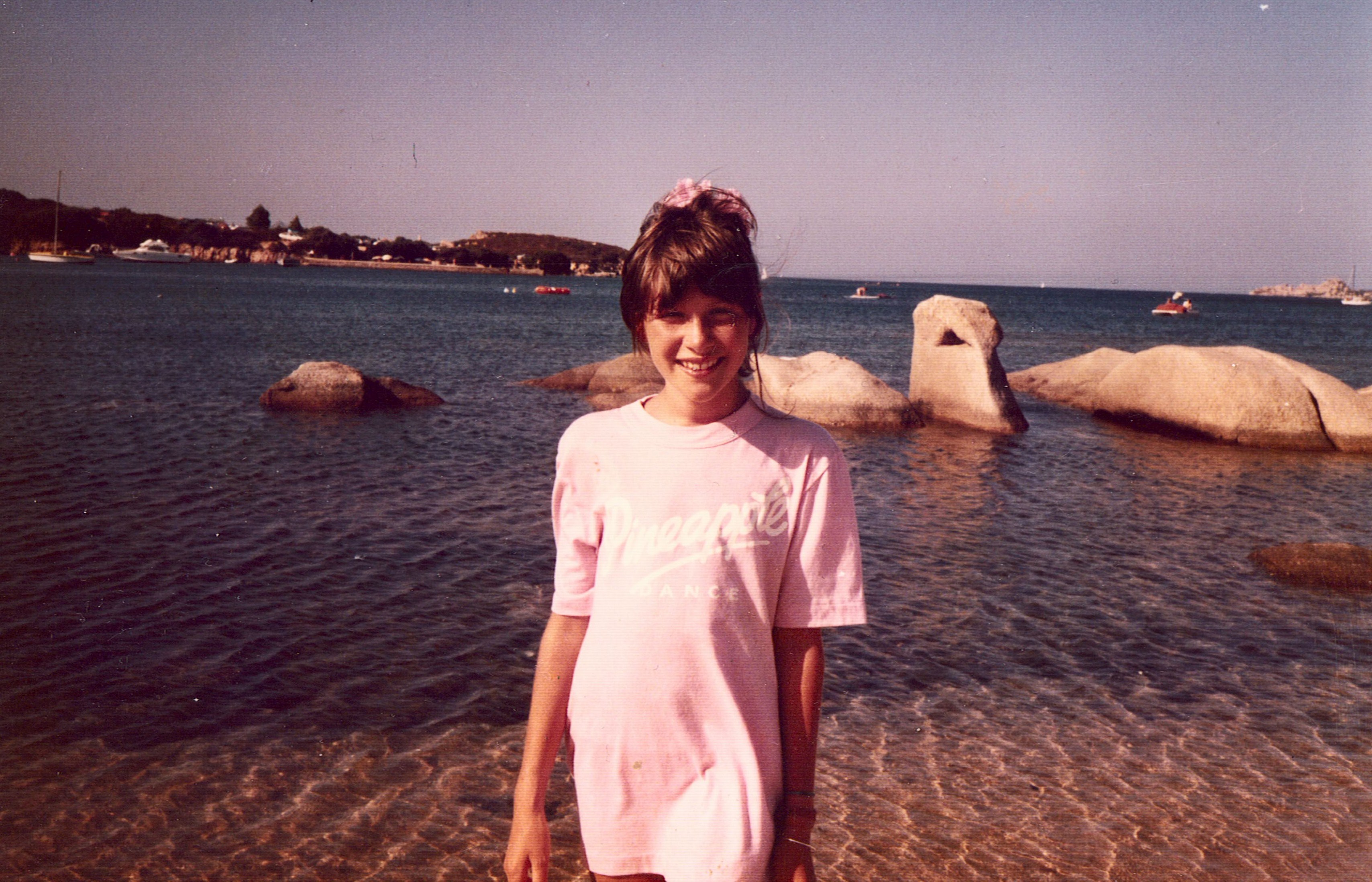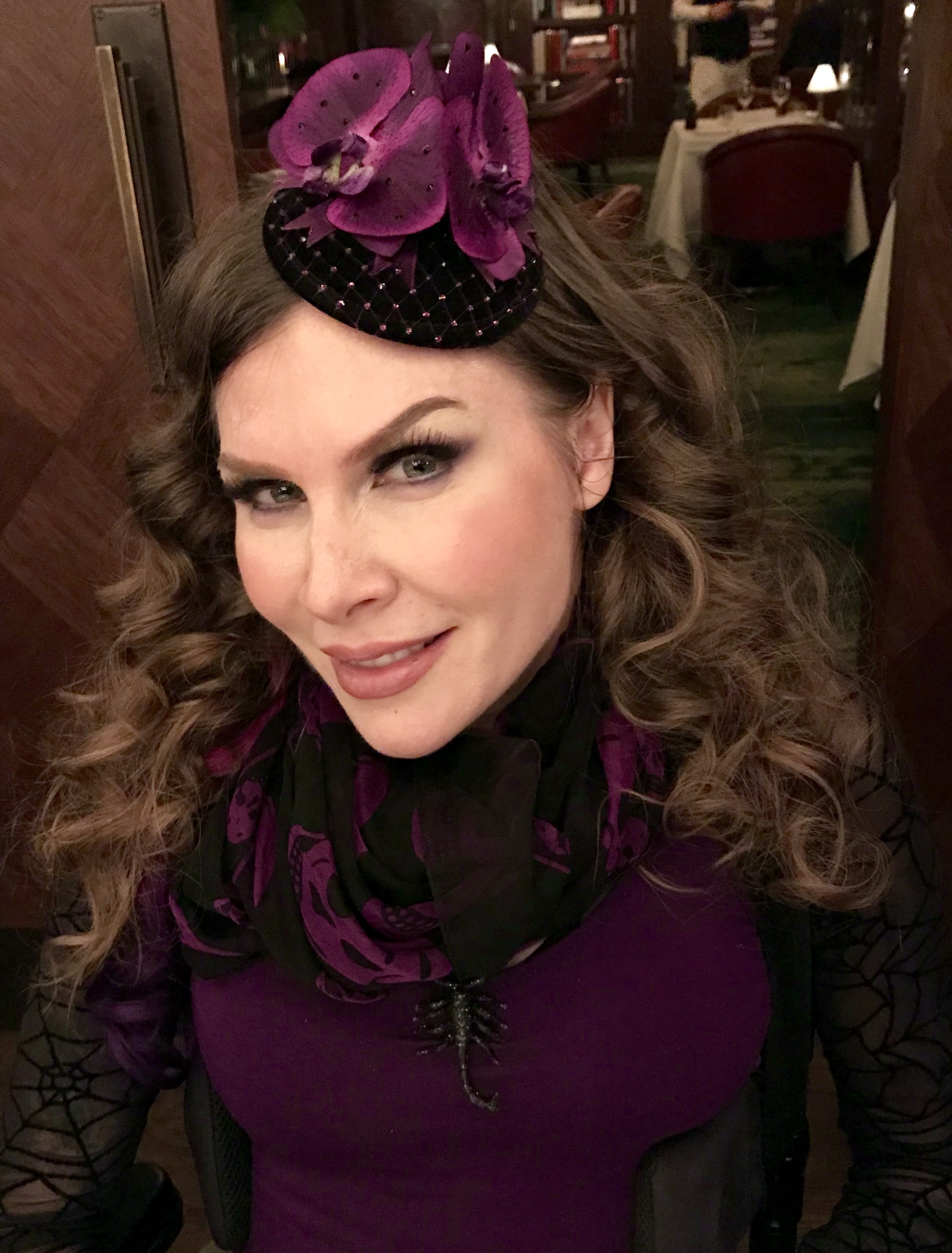When Models of Diversity asked me to write this guest blog to inspire people with my “amazing career and experiences”. I thought; “Say whaaaaaaaaaaat?” I’ve not been on the tellybox since 2008! And there are often times where it feels like my disability is so time-consuming it has become my career. But then I realised I was thinking with my warped ableist-propaganda immersed brain and forgetting that in fact my career and life experiences are epic – thanks for noticing MoD.
My momentary confusion was due to our cultural obsession with prescriptive ways to measure success – however progressive or non-conformist we think we are, very few of us are immune to its insidiousness. It’s quite dizzying the list of “requirements” for success; money, fame, photoshopped beauty, popping muscles, endless “likes”, eternal youth, a perfect partner, 2.4 kids whilst advancing your monumental career – and that’s just a snapshot. Even one of the most ostensibly successful families on the planet, the Kar-Jenners, don’t have quite all this sewn up (pesky errant men) yet these criteria have become part of a blue-print for success which is difficult to escape. So, what happens if you have a disability which precludes you from some, most, or all of this check-list? We have two choices comrades: a) Crumble or b) Realise we have the freedom - maybe an obligation - to rewrite the rules.
 |
| Lara Masters by Rankin, Rankin Loves, 2020 |
We’re all unique blah blah blah but disability takes being the real OG to the next level. Some people are against the word “special” to describe someone differently-abled but I say embrace it Disableds; we are special, in the best possible, least patronising way. We’re in a hugely under-represented, largely marginalised, often ostracised, frequently oppressed, even aggressed minority group but wherever we go we’re gazed upon incessantly, talked about and remembered. However, being the most interesting person in the room only goes so far, using this to our advantage is the key.
Success for disabled people is a different ball-game entirely, firstly because you have to create the game yourself; it’s not so much “road less travelled” as “road doesn’t exist”. You have to learn where your strengths lie and find a way to use them without any roadmap and multiple roadblocks. It’s lonely work and can seem daunting but it’s also very focusing having few choices. And do not underestimate the power of the Disability Card in this new world where diversity is the answer, no matter what the question.
I’ve had nerve degeneration and now I’m clipped and strapped into my power chair like Hannibal Lecter in lipstick. I don’t like to say it “is” a degenerative condition, present/ongoing tense because I still dream of dancing – that’s just one of my tricks to stop me from melting into a sobbing, self-pitying wreck on the regular. With a constantly changing body I’m literally writing and rewriting my life’s path on the fly but rather than feel like a failure when I can no longer do something I love, I try to see myself as an entrepreneur, constantly reinventing myself to adapt to my body’s new terrain.
.jpg) |
| Lara Masters in Pink (age 11) |
This will make sense if I share my story. I was a healthy, active child with a passion for dance but when I was 10 I had a spinal haemorrhage from an arterial venous malformation (AVM) and even though the doctors told my parents I would be paralysed for life, they secretly treated me with the help of our holistic doctor who was also a surgeon and I regained everything apart from some paralysis in my left hand. So I couldn’t be a dancer which was heartbreaking but I set my sights on an acting career getting the lead in all the school plays and winning interschool drama competitions etc. But at 14 I had another spinal bleed the day before I was due to star in a school play which I had directed. After months of complete paralysis I was eventually left with some paralysis in my left leg and foot and required a FES drop-foot splint. My drama teacher told me point-blank an “invalid” couldn’t be an actor because; “What kind of roles could you possibly play?” Even though I passionately disagreed, it was hard to argue at the time as there were no examples of actors with “impairments” – in 1990 Daniel Day Lewis’s Oscar for My Left Foot had positively (or negatively) validated “blacking/disabling up” no questions asked.
That trend continues in the film industry today with huge stars getting lead roles playing characters with disabilities, a recent example being Bryan Cranston in The Upside - but can you imagine if the role of the black carer was played by Brad Pitt in dark make-up? And don't tell me it's a different argument or try the old "well you wouldn't get a serial killer to play a serial killer"; it’s an idiotic premise - serial killers are not a marginalised group in fact they are disproportionately overrepresented in TV and movies. I'm no criminologist but I would hazard a guess that there are more disabled people than there are serial killers and yet we can count on one hand the amount of movies made with disabled starring roles and they’re almost always played by nondisabled actors.
I digress; after leaving uni because my mobility was decreasing and I couldn’t get around campus, I won a place on a playwriting course run by the supremely talented April De Angelis (recently wrote “Jumpy” for the National Theatre) and I wrote a play with a disabled central character based on me. There were a handful of disabled writers on the course writing disabled roles but nothing much came of it. I also worked for a major acting agency and several film production companies critiquing scripts, I went into script development, and also wrote audio description scripts for feature film. I still wanted to act and joined VisAble agency for disabled talent and started modelling and acting or rather going to a casting once in a blue moon because producers weren't much interested in disabled representation although I once got a job advertising a wheelchair-accessible taxi for TFL. Oh the glamour.
I was desperately trying to hang on to my mobility, doing physio and gyming with my trainer who also happened to be training a tabloid photographer and we did a press story about me being a disabled model and I went on This Morning where a TV producer offered me a job presenting with Esther Rantzen and Heather Mills on ITV's "That’s Esther". As a social action type show, Heather and I having disabilities fit the tone and I became the first wheelchair user on prime-time television. F*c*ing unbelievable. I loved my four years on the show, it was hard work but my energy levels were great and I could manage the long filming hours. I was upset when the producer "let me go" but it had become more physically challenging for me by the end of the run. Heather had left earlier to become Mrs Sir Paul McCartney and Esther obviously missed us as the show soon ended; you can’t break up the band.
 |
| In Sardinia, age 12 |
With less stamina and mobility I wanted to do something creative and work mainly from home so my friend and I - who were obsessed with burlesque and dressing up - set up a business designing and making burlesque fascinators. My dexterity had deteriorated so she did the making and I did the admin and helped design. We sold them at craft and fetish fares and had an online shop. We didn't make tons of money but we didn't lose any, however our friendship imploded and so did the business.
Then I got asked to be a judge on BBC3’s Britain's Missing Top Model to find a disabled model in an attempt to change the industry (Kelly Knox won, Sophie Morgan was runner-up). My co-judge was editor of Marie Claire and offered me an online blog as their “It girl on wheels” writing about my experiences of disability and encounters with celebrities. I also wrote the style column for Disability Now and around this time I met my husband-to-be whilst at a nightclub, a bit on the tipsy side.
My mobility had decreased further and my house was becoming more and more inaccessible. My husband and I looked for an accessible place to move to but they didn't exist and I didn't have the money to do huge renovations so my solution was to design a bespoke accessible house to build ourselves. I spent the next year fighting for planning permission and for two years I project managed as my husband and various tradesmen built this small but perfectly formed house. It was definitely the hardest job I've ever had but it was worth the extreme stress.
By the time we moved in my disability had gone from me sitting in an electric wheelchair unaided to me wearing a back support, being clipped in hard on both sides of my ribs and having my right shoulder strapped down so I sit straight. The only voluntary movement I had/have left is in my right arm but the hand is down to 20% mobility if I'm generous. The only thing I can really do independently is use my computer with a speaking program... So what could I do to keep myself out of trouble? I still had a brain that kinda worked, and that burning feeling of injustice, particularly about the entertainment industry's lack of disability inclusion... I decided to write my story as a film with the intention of finding a disabled actor to play the part based on me…
 |
| Lara Masters now |
And that's what I've been doing for the past four years – writing and rewriting. And pushing my script into the reluctant hands of any friend’s cousin’s mother-in-law’s neighbour who once worked in film. It’s not easy; you have to temper tenacity with charm and be open to criticism. I’ve met powerful producers but there is definitely a push from most of them to get someone like Margot Robbie to play my role telling me it is better to get the film made with an able-bodied actor than it never see the light of day with a disabled one. I went along with it for a bit feeling very uneasy (but also Margot Robbie as me!!!! Sigh...) And then I put my foot down one day and insisted we use a disabled actor or not make the film. Stupid, regressive, ableist producers and directors need a big shakeup. We can be somewhat flexible on the disability of course but there isn't any point in me complaining about the industry and then being a hypocrite. So watch this space fellow Disableds. Magic may be about to happen...
.JPG) |
| Lara and Dieter (husband) |
Of course not every day is filled with meetings with Hollywood execs and there are many days when finishing a session on my FES bike, managing the standing frame for 10 min without passing out or going a few hours without pain is a huge success for me. There are also times when I’m so over-whelmed with physical limitations, frustration and pain that I sink into a very dark place and it feels as if I’ll never surface. But I do, and I’m full of gratitude to myself and my higher power for those reservoirs of strength that I draw on, sometimes even to just get through the day. That’s stratospheric success for me; to be able to keep on keeping on. It's all relative; you’ve just got to work with what you’ve got.

.jpg)

